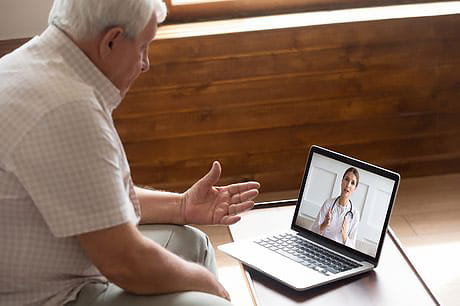Stroke care continues with telemedicine
Our stroke teams remain ready to care for you with leading-edge treatment and compassionate care.
Global health pandemic or not, our stroke care teams remain ready to provide you and your family the same level of care you’ve always counted on.
Just as it would be necessary to seek care in the event of a heart attack or traumatic injury, Dr. Clemens Schirmer, vice chairperson of Geisinger’s Neurosurgery Department, urges you not to wait if you suspect you or a loved one may have stroke symptoms.
“Getting care quickly and recognizing symptoms of a stroke are so important,” says Dr. Schirmer.
Symptoms of a stroke can include:
- Sudden weakness or numbness in your face, arm, or leg on one side of your body
- Abrupt loss of vision, coordination, strength, speech, sensation or the ability to understand speech
- Sudden loss of balance
- Vomiting, nausea, fever, hiccups or trouble swallowing
- Sudden vision dimness, especially in one eye
- Sudden and severe headache with no apparent cause, followed by rapid loss of consciousness
- Sudden falls or unexplained dizziness
Dr. Anthony Noto, vice chairperson of the Neurology Department, says there are some symptoms people may not always attribute to a stroke, including changes in vision and balance. But knowing these can be signs of a stroke — and getting care as soon as possible — can save a life.
“That’s why it’s important for people to know that the sooner they seek care, the better their treatment and recovery will be,” says Dr. Noto.
Telemedicine makes a difference in stroke care
Telemedicine (or a virtual doctor visit) has become a new part of many people’s healthcare — and that’s no different for those who have experienced a stroke. Although Geisinger’s stroke team has been seeing and treating patients through telemedicine more often during the coronavirus pandemic, virtual visits are nothing new to them.
Our stroke teams have been using telestroke (or stroke telemedicine) for more than a decade, which allows our neurologists and neurosurgeons to examine and treat people who have had strokes remotely using special technology.
Members of our stroke team are also reaching out to people who are at a higher risk for having a stroke. And it’s working.
“Through artificial intelligence algorithms, we’ve been able to identify patients at risk of stroke,” says Dr. Schirmer. “In fearing some people are not aware of symptoms, we can educate and identify those who may be having symptoms and are pondering whether to come into the hospital.”
Get stroke care when you need it
If you’re unsure whether you could be having a stroke, it’s better to be get your symptoms checked out by a medical professional.
This acronym could save your or a loved one’s life. During a stroke, remember to BE FAST:
- Balance difficulties
- Eyesight changes
- Face drooping
- Arm weakness
- Speech difficulty
- Time to call 911
Keeping you safe when you visit us in-person
Worries about contracting the coronavirus should not be a reason for anyone to delay stroke care, adds Dr. Schirmer.
“Our hospitals are following all precautions necessary to ensure your safety during the COVID-19 pandemic,” he says.
These precautions include:
- Isolating those with COVID-19 or related symptoms in separate, designated areas and units.
- Requiring staff, patients and visitors to wear a mask at all times. Wearing a mask helps protect others around you — and yourself — from the coronavirus. All of our medical personnel are wearing masks and taking extra steps to protect our patients, communities and themselves.
- Limiting the number of people in our waiting rooms and expanding the space between chairs.
- Arranging our exam rooms to reduce unnecessary contact with high-touch surfaces.
- Deep cleaning our care sites between patients and multiple times throughout the day.
- Limiting the number of visitors in our hospitals and clinics.
- Screening every person when they come in — patients, visitors and employees — including taking temperatures with a no-touch thermometer. By screening all our employees for COVID-19, no matter where they work, we’re taking significant precautions to keep our staff and patients safe.
Next steps:
Make an appointment with Clemens Maria Schirmer, MD, PhDMake an appointment with Anthony Noto, MD
Learn more about stroke treatment
Want to schedule a virtual appointments? Get started with telemedicine

Telemedicine video visits
See your doctor from the comfort of home — from routine care to specialty care
Get virtual care nowCOVID-19 updates: Visit Geisinger's Coronavirus Resource Center for the latest information and helpful resources.
